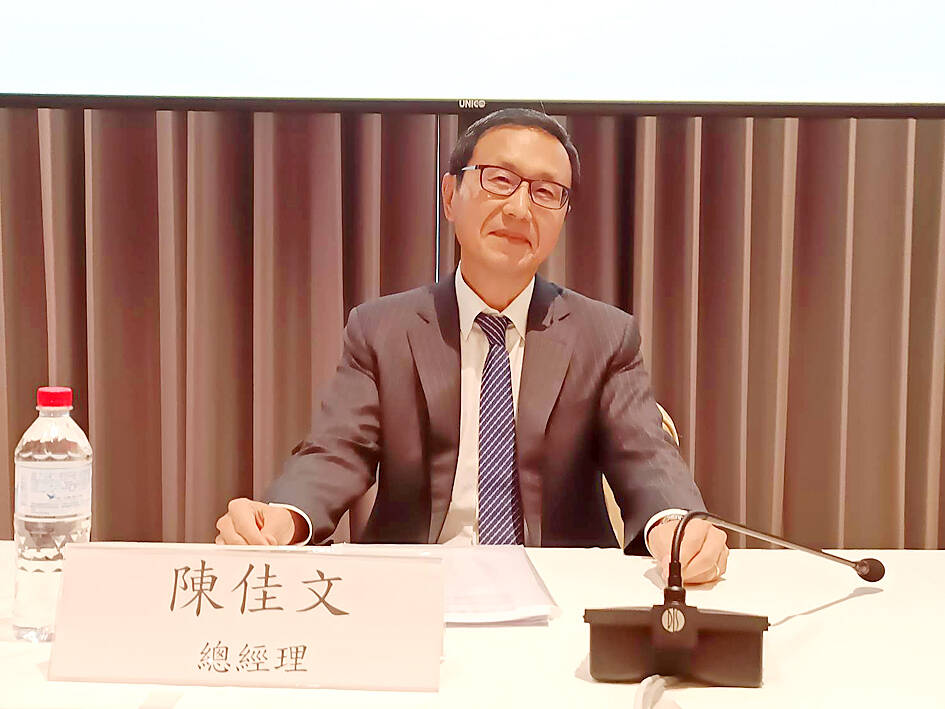CTBC Bank Co (中信銀行) might record slower growth in its mortgage business this year as central bank rate hikes and selective credit controls affect the local real-estate market, CTBC Financial Holding Co (中信金控) president James Chen (陳佳文) said yesterday.
CTBC Bank's mortgages rose 13.7 percent year-on-year to NT$974 billion (US$31.61 billion) in the first quarter of this year, the second-largest kind within its loan pipeline after foreign currency-denominated lending of NT$1.15 trillion, it told an investors’ conference in Taipei.
Chen said that whole-year mortgage growth is expected to be lower than last year, increasing by a single-digit percentage, as the real-estate market is on a downward trend.

Photo: Lee Ching-hui, Taipei Times
However, as CTBC Bank has concentrated on providing home loans to civil servants and teachers, its mortgage quality remains solid, he said.
CTBC Bank’s net profit rose 52.9 percent from a year earlier to NT$11.36 billion in the first quarter, making up 88 percent of its parent company’s net profit. The bank's net profit grew 37.9 percent from the previous quarter.
Chen said the bank’s overseas branches contributed 35 percent to CTBC Bank’s net profit in the first quarter, supported by strong growth in Hong Kong, Singapore and Thailand.
As the bank has large US dollar deposits, it earned more interest income with the US Federal Reserve hiking rates, while corporate lending in Thailand also showed marked growth as Taiwanese companies continued to shift their operations away from China to Southeast Asia, he said.
In the first quarter, CTBC Financial reported net profit of NT$12.96 billion, down 20.5 percent from a year ago. On a quarterly basis, net profit surged by 1,528.3 percent. Earnings per share were NT$0.66 in the quarter.
The company's life insurance unit, Taiwan Life Insurance Co (台灣人壽), remained in the red in the first quarter with net losses of NT$882 million. But the figure was down 21 percent from a year earlier, CTBC Financial said, adding that the insurer has passed the worst after COVID-19 insurance claims caused greater chaos for the sector last year.
Meanwhile, CTBC Financial plans to expand CTBC Finance Co’s (中國信託資融) business from car loans to “buy now, pay later” and corporate lending operations, to enhance its competitiveness, while CTBC Insurance Co (中國信託產險) plans to raise NT$5 billion later this month to boost its risk-based capital ratio to 200 percent, he said.
Overall, CTBC Financial is expected to report better profit this year than last year, he said.

When an apartment comes up for rent in Germany’s big cities, hundreds of prospective tenants often queue down the street to view it, but the acute shortage of affordable housing is getting scant attention ahead of today’s snap general election. “Housing is one of the main problems for people, but nobody talks about it, nobody takes it seriously,” said Andreas Ibel, president of Build Europe, an association representing housing developers. Migration and the sluggish economy top the list of voters’ concerns, but analysts say housing policy fails to break through as returns on investment take time to register, making the

‘SILVER LINING’: Although the news caused TSMC to fall on the local market, an analyst said that as tariffs are not set to go into effect until April, there is still time for negotiations US President Donald Trump on Tuesday said that he would likely impose tariffs on semiconductor, automobile and pharmaceutical imports of about 25 percent, with an announcement coming as soon as April 2 in a move that would represent a dramatic widening of the US leader’s trade war. “I probably will tell you that on April 2, but it’ll be in the neighborhood of 25 percent,” Trump told reporters at his Mar-a-Lago club when asked about his plan for auto tariffs. Asked about similar levies on pharmaceutical drugs and semiconductors, the president said that “it’ll be 25 percent and higher, and it’ll

CHIP BOOM: Revenue for the semiconductor industry is set to reach US$1 trillion by 2032, opening up opportunities for the chip pacakging and testing company, it said ASE Technology Holding Co (日月光投控), the world’s largest provider of outsourced semiconductor assembly and test (OSAT) services, yesterday launched a new advanced manufacturing facility in Penang, Malaysia, aiming to meet growing demand for emerging technologies such as generative artificial intelligence (AI) applications. The US$300 million facility is a critical step in expanding ASE’s global footprint, offering an alternative for customers from the US, Europe, Japan, South Korea and China to assemble and test chips outside of Taiwan amid efforts to diversify supply chains. The plant, the company’s fifth in Malaysia, is part of a strategic expansion plan that would more than triple

Taiwanese artificial intelligence (AI) server makers are expected to make major investments in Texas in May after US President Donald Trump’s first 100 days in office and amid his rising tariff threats, Taiwan Electrical and Electronic Manufacturers’ Association (TEEMA, 台灣電子電機公會) chairman Richard Lee (李詩欽) said yesterday. The association led a delegation of seven AI server manufacturers to Washington, as well as the US states of California, Texas and New Mexico, to discuss land and tax issues, as Taiwanese firms speed up their production plans in the US with many of them seeing Texas as their top option for investment, Lee said. The